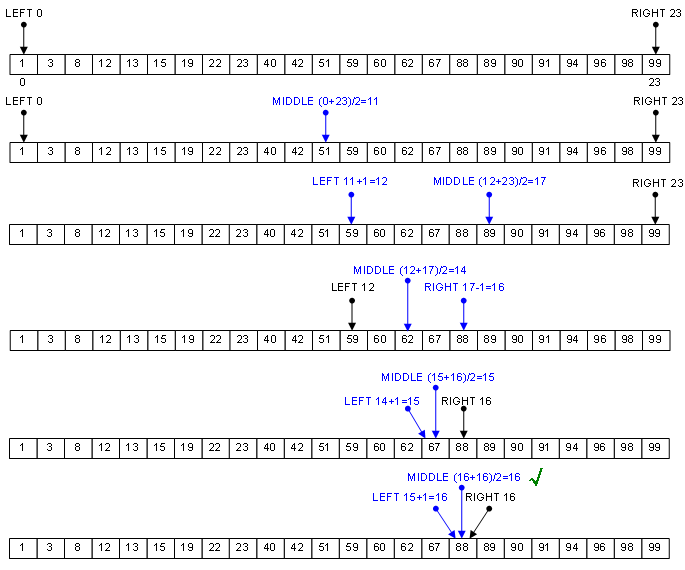转载自http://www.cppblog.com/guogangj/archive/2009/10/15/98649.html
如何从数组里找一个元素的位置?如果排列是无序的,我们只能从头到尾找,但如果排列是有序的,我们则可以用别的更好的方法,二分查找法就类似我们在英汉词典里找一个单词的方法。如下图所示(假如我们要查找的数字是“88”):
下面我给出了一段demo代码,来演示二分查找法比顺序查找快多少,代码为了方便起见,初始化有序表的时候填入的数字都是均匀的,而事实上数字可以不均匀。你可以调整一下代码中TABLE_SIZE的值,从500,调到5000,再调到10000,再调到30000……你会发觉两者差距越来越明显。我在第一篇的地方提到二分查找法的复杂度为Ο(logn),而顺序查找的复杂度为Ο(n),当n越来越大时候,Ο(logn)的优势也就越来越明显,当然了,前提是“有序”,才可用二分查找法。
- #include "stdio.h"
- #include "time.h"
- #define TABLE_SIZE 50000
- //returns the position, -1 means failed.
- int SequenceSearch(int *pArray, int iArraySize, int iVal)
- {
- int i;
- for(i=0; i<iArraySize; i++)
- {
- if(pArray[i]==iVal)
- return i;
- }
- return -1;
- }
- //returns the position, -1 means failed.
- int BinarySearch(int *pArray, int iArraySize, int iVal)
- {
- int iLeft = 0;
- int iRight = iArraySize-1;
- while(iLeft<=iRight)
- {
- int iMiddle = (iLeft+iRight)/2;
- if(iVal < pArray[iMiddle])
- {
- iRight = iMiddle-1;
- }
- else if(iVal > pArray[iMiddle])
- {
- iLeft = iMiddle+1;
- }
- else
- return iMiddle;
- }
- return -1;
- }
- int main(int argc, char* argv[])
- {
- //make the table
- int table[TABLE_SIZE];
- int i;
- for(i=0; i<TABLE_SIZE; i++)
- {
- table[i] = i*2;
- }
- clock_t ctBegin = clock();
- //Test sequence search
- for(i=0; i<TABLE_SIZE; i++)
- {
- SequenceSearch(table, TABLE_SIZE, i*2);
- }
- clock_t ctEnd = clock();
- printf("SequenceSearch takes %d clocks.\n", ctEnd-ctBegin);
- //Test binary search
- ctBegin = clock();
- for(i=0; i<TABLE_SIZE; i++)
- {
- BinarySearch(table, TABLE_SIZE, i*2);
- }
- ctEnd = clock();
- printf("BinarySearch takes %d clocks.\n", ctEnd-ctBegin);
- return 0;
- }
转载自http://www.cppblog.com/guogangj/archive/2009/10/15/98649.html
如何从数组里找一个元素的位置?如果排列是无序的,我们只能从头到尾找,但如果排列是有序的,我们则可以用别的更好的方法,二分查找法就类似我们在英汉词典里找一个单词的方法。如下图所示(假如我们要查找的数字是“88”):
下面我给出了一段demo代码,来演示二分查找法比顺序查找快多少,代码为了方便起见,初始化有序表的时候填入的数字都是均匀的,而事实上数字可以不均匀。你可以调整一下代码中TABLE_SIZE的值,从500,调到5000,再调到10000,再调到30000……你会发觉两者差距越来越明显。我在第一篇的地方提到二分查找法的复杂度为Ο(logn),而顺序查找的复杂度为Ο(n),当n越来越大时候,Ο(logn)的优势也就越来越明显,当然了,前提是“有序”,才可用二分查找法。
- #include "stdio.h"
- #include "time.h"
- #define TABLE_SIZE 50000
- //returns the position, -1 means failed.
- int SequenceSearch(int *pArray, int iArraySize, int iVal)
- {
- int i;
- for(i=0; i<iArraySize; i++)
- {
- if(pArray[i]==iVal)
- return i;
- }
- return -1;
- }
- //returns the position, -1 means failed.
- int BinarySearch(int *pArray, int iArraySize, int iVal)
- {
- int iLeft = 0;
- int iRight = iArraySize-1;
- while(iLeft<=iRight)
- {
- int iMiddle = (iLeft+iRight)/2;
- if(iVal < pArray[iMiddle])
- {
- iRight = iMiddle-1;
- }
- else if(iVal > pArray[iMiddle])
- {
- iLeft = iMiddle+1;
- }
- else
- return iMiddle;
- }
- return -1;
- }
- int main(int argc, char* argv[])
- {
- //make the table
- int table[TABLE_SIZE];
- int i;
- for(i=0; i<TABLE_SIZE; i++)
- {
- table[i] = i*2;
- }
- clock_t ctBegin = clock();
- //Test sequence search
- for(i=0; i<TABLE_SIZE; i++)
- {
- SequenceSearch(table, TABLE_SIZE, i*2);
- }
- clock_t ctEnd = clock();
- printf("SequenceSearch takes %d clocks.\n", ctEnd-ctBegin);
- //Test binary search
- ctBegin = clock();
- for(i=0; i<TABLE_SIZE; i++)
- {
- BinarySearch(table, TABLE_SIZE, i*2);
- }
- ctEnd = clock();
- printf("BinarySearch takes %d clocks.\n", ctEnd-ctBegin);
- return 0;
- }